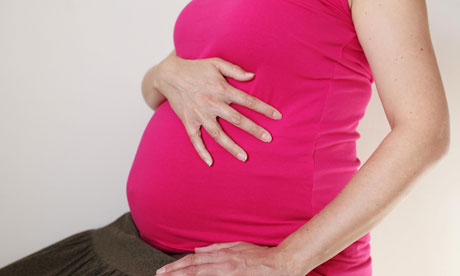
For most women, the idea of reaching the late stages of pregnancy without knowing it is simply unimaginable. But doctors say that although by no means common, the predicament of Camp Bastion's new mother is not unprecedented – among civilians, at least.
"It's unusual, bordering on rare, but it does happen," said Dr Patrick O'Brien, spokesman for the Royal College of Obstetricians and Gynaecologists. "Everybody says, well, how can it happen?" The answer, experts say, often lies in the absence of the physical symptoms normally seen during pregnancy.
"For example, there are some women who have very, very rare periods anyway, so that sign is missed," said O'Brien, a consultant obstetrician at University College Hospital. He noted that women who exercised intensively were known sometimes to menstruate infrequently. "There's a significant proportion of women who don't get any sickness in pregnancy, so that's missed. There are some women, particularly who are overweight, who don't notice the bump, and who don't feel the baby's movements until a bit later. And there are some babies that don't grow very well, so they're much smaller than expected."
The frequency of so-called concealed pregnancies – where a woman has actively hidden the fact she is expecting or appears genuinely not to have known – is the subject of some speculation. An 11-year study in south Wales, published in 2006, found an incidence rate of one in 2,500 deliveries. Another, in Germany in 2001, found a rate of one in 475 during the first 20 weeks. An Irish study (pdf) based on data from 2004-05 found a rate of one in 403 births at a rural hospital and one in 625 at a Dublin hospital.
Belinda Phipps, chief executive of the National Childbirth Trust, said that in this instance the high-pressure conditions in which the soldier was working may have contributed to her not realising a baby was growing inside her. "If you are young or in your 40s when the pattern of your periods may vary and you may be experiencing other physical changes, it is easier not to realise you are pregnant," she said. "Also, if you don't expect to be pregnant, are busy and stressful, or in a life-or-death situation, you may be so focused on what is happening in your life that you don't spot or put to the back of your mind the signs of pregnancy you may be experiencing."
Aside from the physical aspects, the psychological state of the mother is sometimes key. Among some women, said O'Brien, typically teenage girls, "the consequences … of a pregnancy are so terrible that their mind actually denies it. So even though at a subconscious level they notice these changes taking place in their body, their conscious mind suppresses it and they actually honestly haven't appreciated the fact that they're pregnant because they won't allow themselves to be."

